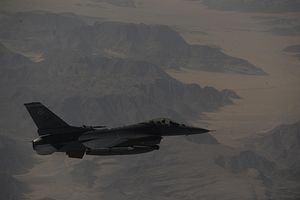The United States and Pakistan find each other at odds again—this time over the sale of the U.S. single-engine, multirole F-16 block 52 fighter aircraft to Pakistan. As a major non-NATO ally in the war against terror, Pakistan expected to be able to purchase the jets for a subsidized price. But the subsequent reaction of U.S. lawmakers has once again put the fractious relationship between both countries into the spotlight, as they effectively denied Islamabad any U.S. subsidies. The relationship between the two countries has previously been marred by trust deficits over domestic security and terrorism.
The F-16 issue centers on the initial deal, where Pakistan expected to pay $270 million from its national funds to purchase the jets. The United States, on the other hand, was to pay the rest of the amount from its Foreign Military Financing fund (FMF), which encompasses an array of grants and loans aimed at helping foreign countries purchase military equipment produced in the United States. However, schisms began to emerge between both countries as U.S. lawmakers made it clear that the Obama administration should not use taxpayer funds to help Pakistan fund the purchase of the jets. That development has resulted in the near nullification of the initial deal.
The subsequent reaction in Pakistan underlines its valid concerns. The Prime Minister’s Adviser on Foreign Affairs Sartaj Aziz has claimed that Pakistan can look elsewhere for fighters if the U.S. continues to stall the purchase. His reference to the JF-17 Thunder for counterterrorism operations is an obvious hint at China as an alternative source. The JF-17 project is a joint venture between the Pakistan Aircraft Complex (PAC) and the Chengdu Aircraft Corporation (CAC) in China. Unlike the United States, China has also been historically viewed as a partner that has been less transactional towards Pakistan over defense-related matters. Moreover, the $46 billion China-Pakistan Economic Corridor buttresses this point. Unlike the United States, which continues to press the ‘Do More Mantra’ toward Pakistan regarding the Haqqani network and other militant groups, China has expressed its satisfaction over the Pakistan Army’s ability to clamp down on militants, such as the East Turkestan Islamic Movement.
U.S. encouragement for Pakistan to do more aside, the United States is also considering the possibility of cutting down funding to persuade Pakistan to release Dr. Shakil Afridi, the famed physician who aided the Central Intelligence Agency (CIA) to track down Osama Bin Laden in the Abbottabad compound five years ago. Pakistan had long contended that Dr. Afridi had acted against the interests of the state and is to remain imprisoned under Pakistani law. Linking congressional aid to the release of Dr. Afridi will undoubtedly be viewed as a coercive tactic on part of the United States by Pakistan, which is already irked by the fact that its state sovereignty was violated when the 2011 Abbottabad raid took place. In addition, palpable anti-Americanism in the country continues to grow due to drone strikes, India-U.S. ties (where the India-U.S. nuclear deal is seen to have weakened the global nonproliferation order), as well as due to memories of incidents like the Salala Check Post attack in 2011. These sentiments could strengthen as bilateral relations continue to be complicated by matters such as the F-16 deal.
Hence, this latest development regarding the F-16s and subsequent developments linking Dr. Afridi’s release with U.S. assistance can be considered as another point of divergence between the United States and Pakistan, which have otherwise shared an important and difficult relationship.
Hamzah Rifaat is Research Associate at the Global Think Tank Network at the National University of Sciences and Technology, and a 2016 Visiting Fellow at the Stimson Center.

































